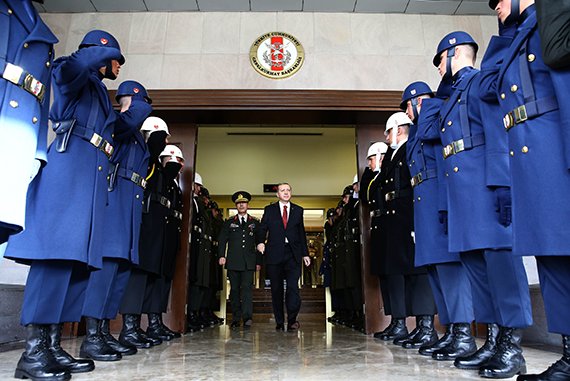
The ferocity of the fighting between Syria’s government forces and various proxies vying for control of territory and resources has Turkey on edge and has already led to several deadly clashes involving the only NATO member state bordering the civil war.
With Turkey, Russia, Iran, Iraq, and Gulf states pursuing their own, often conflicting aims in Syria, all against the backdrop of a U.S.-led air and commando campaign against the Islamic State (IS), there is renewed concern at NATO’s headquarters in Brussels that Turkey could see the next flare-up as grounds for citing Article 5: in effect, demanding that its NATO allies deploy forces and come to its collective defense.
Turkey has already invoked the lesser-known Article 4—a demand for an emergency consultation of the alliance—following the downing of a Turkish warplane under disputed circumstances last spring. Incidents like this and the threat that Bashar Assad’s forces might launch Scud missiles into Turkey led NATO members—the United States, Germany, and Spain—to deploy Patriot anti-aircraft missiles along the border in early 2013, though the German and American batteries have since been withdrawn. Spain’s—a less capable version of the Patriot—is geared towards anti-aircraft, as opposed to anti-ballistic missile defense, and therefore deemed more appropriate
But could a new incident—a missile strike, an IS incursion, or Syrian artillery bombardment across the border—bring the full might of NATO into the war? Many are skeptical, and for good reason.
The history of invocations of NATO’s Article 5 is short and somewhat underwhelming. In the 68 years of the North Atlantic alliance’s history, plenty of low-intensity conflicts involving NATO nations have raged, from rebellion in France’s Algerian departments, to the U.S. war in Vietnam, through the Balkan wars of the 1990s. Yet only once has Article 5’s “all-for-one, one-for-all” facility been invoked: that was September 12, 2001, the day after the al-Qaida attacks on the United States.
Even then, its effect was primarily symbolic. While the United States expressed its deep appreciation at the time, NATO involvement in Afghanistan would be minimal for years to come, though British, French, and a handful of other elite forces arrived as early as November that year. In practice, though, it was not until late 2003, when NATO assumed command of the International Security Assistance Force (ISAF), that alliance troops arrived in force, and even then often under restrictive rules of engagement that limited their effectiveness.
Indeed, ISAF, the force NATO led from August 2003 to December 2013, was a UN-sanctioned operation that included not only forces from NATO’s 28 militaries but troops and specialists from 48 states, including such disparate contributors as Mongolia, Tonga, and Singapore. At its height in 2010–11, ISAF numbered more than 42,000 troops, augmenting 100,000 U.S. troops.
Turkey would sorely like a commitment of that scale. Yet the subtle diplomatic realities of the North Atlantic alliance—as well as the very unsubtle nature of its own activity inside Syria—make this highly unlikely.
For one thing, Turkey’s own military has acted aggressively in targeting Syria’s Kurdish rebels, the People’s Protection Units, or YPG, which Ankara views as little more than a proxy for the outlawed separatist guerrillas of the Turkish Kurds, the Kurdistan Workers’ Party, or PKK. Last week, the Turks opened up on the Kurdish-held air base at Aleppo, in spite of the fact that the city is surrounded by forces loyal to Assad, the presumed enemy in Syria. The act enraged almost everyone. Russia demanded at an emergency Security Council meeting a censure of Turkey’s violation of Syrian sovereignty, and President Obama, who regards the Kurdish as the most reliable ground force in the fight against the IS, urged Turkish President Recep Tayyip Erdogan in an 80-minute phone call on February 19 to avoid provocative actions.
While NATO has taken no official position on the question of Article 5—not surprising, since no formal request has been made—through back channels the alliance has been telegraphing a resounding “no” to Turkey for weeks. Last week, Luxembourg’s Foreign Minister Jean Asselborn told Germany’s DerSpiegel that “NATO cannot allow itself to be pulled into a military escalation with Russia as a result of the recent tensions between Russia and Turkey.”
Whatever the fate of the current U.S.-push to secure a cease fire, a large NATO ground force, of the kind that deployed to Bosnia, Kosovo, and Afghanistan, is not on the table.
Michael Moran is a Visiting Media Fellow and author of The Reckoning: Debt, Democracy and the Future of American Power. The opinions expressed here are those of the author, and not necessarily of the Corporation.
